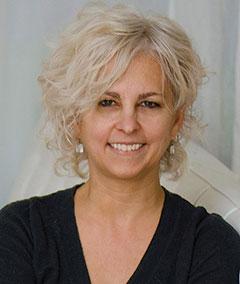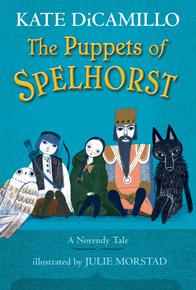
Kate DiCamillo has written almost three dozen dearly loved books for children--including The Tale of Despereaux (which celebrated its 20th anniversary this September) and Flora & Ulysses--both of which received Newbery Medals--and Because of Winn-Dixie, a Newbery Honor book. She was also a National Ambassador for Young People's Literature, appointed by the Library of Congress.
With The Puppets of Spelhorst (Candlewick Press, reviewed in this issue), DiCamillo introduces readers to her projected trilogy of novellas taking place in the fairy tale land of Norendy. Shelf Awareness was delighted to talk with DiCamillo about story, complicated hearts, and the importance of finding one's purpose.
The Norendy Tales are described as a "trio of novellas linked by place and mood." This is an intriguing concept, veering from the more typical progressive series.
I love the idea of nested stories, of stories within stories, of characters being connected across time and space. When I started these fairy tale novellas, I didn't plan for them to be connected, but then I could kind of squint and see that they could be all in the same imaginary place. It was deeply satisfying to think about, and my editor (Andrea Tompa) was happy to squint and imagine with me.
Norendy? Where did this name come from?
Norendy as a place name first showed up in the story I wrote for the anniversary edition of The Tale of Despereaux. And then, I thought, "This place name is evocative, I wonder if we can move it over to fairy tale land." As to where the word Norendy came from... some strange pocket of my imagination.
 Puppets play a starring role in this first title of the Norendy Tales. Do you think kids sometimes feel as though they are being maneuvered and manipulated by forces outside their control?
Puppets play a starring role in this first title of the Norendy Tales. Do you think kids sometimes feel as though they are being maneuvered and manipulated by forces outside their control?
Oh, most definitely. I mean, I felt that way--I just remember a feeling of powerlessness, of having no agency. Sometimes I still feel that way. But telling a story, being told a story--that gives me a feeling of meaning and purpose.
Feminism, or at least girl power, seems to sneak quietly into a lot of your books. What role do you think children's fiction plays in the advancement of social issues?
I would like to think that stories help us see the world more clearly and with more compassion. We know for a fact that stories develop empathy. And for things to change (the advancement of social issues) we need to be able to imagine our way into other lives.
Every one of the characters in The Puppets of Spelhorst could be someone we know. The king puppet, for example, wants to rule, at all costs. Like a toddler, he proclaims, "I command that someone make something happen. Immediately." Do you take surreptitious notes on everyone you meet?
Ha. You made me laugh out loud. I don't take surreptitious notes on everyone I meet, but I am always paying attention--listening, watching--to the people around me, and to my own complicated heart.
The wolf puppet is guileless in her violent tendencies, like yet another toddler. Why is (younger sister) Martha so fascinated by the wolf? And why does she try to extract the wolf's fangs?
Those teeth! They are well and truly sharp! There is something fascinating about those teeth. They bespeak power and purpose, and I think that is why Martha is so fascinated by them.
Both the old sea captain and the boy puppet are stubborn and a bit heedless in their desire to seek "glory and fame" (the old man) or to "do a great deed" (the puppet) despite their effect on the lives of those around them. Why is this theme important to you?
Oh--themes. I never really see the themes in a story I tell until readers point them out to me. So, I guess I would say that I am preoccupied (as a writer) with how we move through the world--how what we want intersects with what other people (or puppets) want, and how we can find community despite, or because of that.
Jane Twiddum, the maid, is sort of a surprise star, perhaps Best Supporting Actress. How much of that was planned by you (and how much by her)?
I love that you give the credit for Jane Twiddum's fate to Jane herself. That's exactly right. I planned none of that. I was surprised and delighted by Jane's actions.
Destiny and possibility loom large in The Puppets of Spelhorst. How do you think the two concepts play together?
That's a complicated question (come to think of it, they've all been kind of complicated--which is good! I'm really using the old noggin here). I think we don't necessarily know our destinies (see Jane Twiddum) but we need to remain open to the possibilities, always.
What did you think you might learn while writing this book? What did you actually learn?
I don't know that I sat down thinking that I would learn something. Rather, I just thought, "Oh, there's a story with this owl puppet and this wolf puppet. Let me see if I can tell it." But then, everything that happened surprised me. And what I learned from Jane Twiddum (it's all about Jane Twiddum) is it is never too late to become who you are.
What was your process working with Julie Morstad? Do you have a favorite illustration in the book?
Julie's artwork knocked me off my feet. It is so perfect, so absolutely right. But (Jane, again) that last picture in the book? It takes my breath away. My editor and Chris Paul (who designed the book) communicated with Julie. I would get to see sketches as she did them, and I commented on them--but mostly what I did was say, "Oh, swoon, that is perfect. Oh, that is divine. Oh, that is just exactly as I hoped it would be."
Why don't you shy away from using big words (enterprise, portentousness, wondrous, bedraggled...) for young readers?
I love words. And as a kid, I learned so many words through reading stories. Every time a writer trusted me enough to give me a word I didn't know, I felt seen. I like giving that gift to readers.
Do you ever imagine your characters from different books interacting with each other?
WOW! What a beautiful question. I can feel myself tumbling down the rabbit hole of possibilities. I've truly never thought about that before--talk about stories nesting within stories!
Any hints about what we can expect from future titles in the Norendy Tales?
Um... magic, possibility, adventures. How's that?

